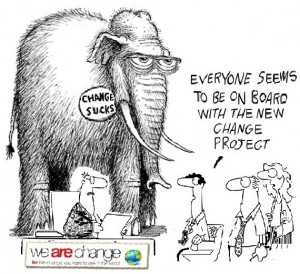It is important to focus on relevant priorities when navigating through change. Few things are more irritating to people than being forced to implement changes which don’t deal with the issues. Consider the things that might really occupy people’s minds;
* what does it mean for me?
*are my ideas being heard?
* will things be better?
*will work be more effective?
*do we agree that these are priorities?
* will new costs replace the old ‘bad’ ones?
*will users’ complaints be addressed?
*will changes add any real value?
*will this just create more layers of ‘work’?
If we ignore obvious issues we risk establishing a norm where honesty is avoided in conversations. This leads to people wrongly assuming that honesty should be traded-off against ‘support for change’ such that people fall into ‘towing the party line’. Unfortunately, over time, a lack of openness undermines trust. More fundamentally, there are more immediate operational effects, since filtered discussions block learning and improvement. Previously we have pointed out that (quoting Basil Fawlty) the ‘bleedin’ obvious’ can be unhelpful. This is true if noticing the obvious is not followed by thinking about the issues- seeking symptoms not causes.
It would be more helpful to stop ignoring the ‘elephant in the room’; we should stop pressing on regardless or merely ‘just doing our best’ in the face of genuine difficulties. Nevertheless, it does take effort to change; we need new types of knowledge and skills. People need to establish new ways of thinking and working, to share ideas, to identify and test recommendations, to communicate those ideas and implement relevant action. The good news is that all of these things can be learned.
There are also some useful ways to analyse problems which help to identify priorities, such as 80/20 thinking (see Barratt and Coppin 2002), which Joe Juran was the first to identify as a “universal principle” applicable to many fields; focus on the ‘vital few’ rather than the ‘trivial many’. It is helpful to be ready to seek knowledge (and get some hard data) before plunging headlong into well-intentioned but mis-directed effort.
Read more:
Coppin, A. and Barratt, J. (2002) Timeless Management, Palgrave MacMillan, NY
Juran J. (1989) Juran on Leadership For Quality,The Free Press, NY

